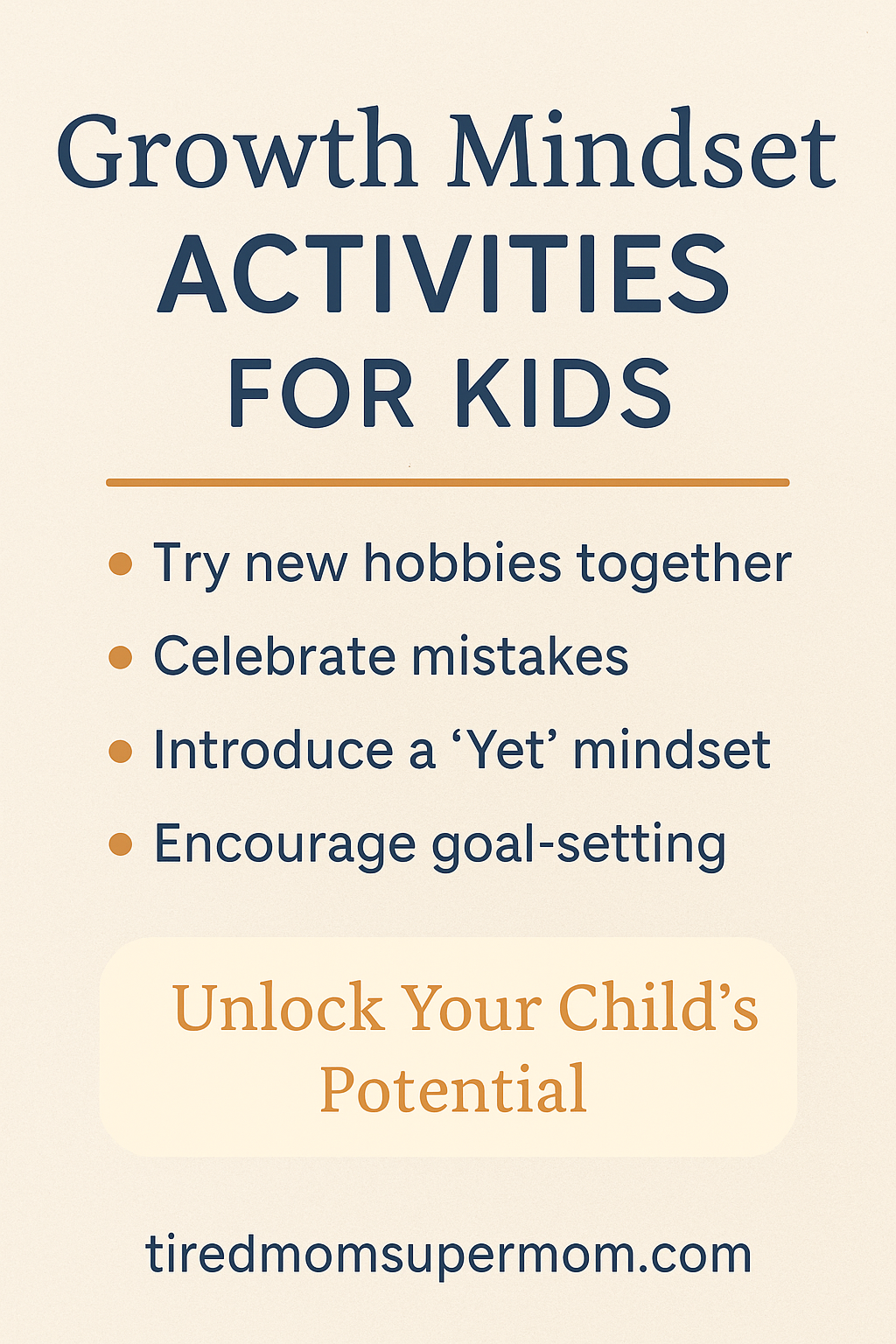15 Growth Mindset Activities For Kids To Unlock Their Potential (With Examples)
Helping kids develop a growth mindset is one of the best gifts you can offer them. It encourages resilience, perseverance, and a love of learning — qualities that help children succeed in school, friendships, and future challenges.
In this guide, we’ll dive deep into growth mindset activities for kids you can start today!
Heads up: This post may include affiliate links. As an Amazon Associate, I earn from qualifying purchases—at no extra cost to you. Full privacy policy and disclosure here.

What Is a Growth Mindset?
A growth mindset is the belief that abilities, intelligence, and talents can be developed with effort, learning, and persistence.
Coined by psychologist Carol Dweck, this concept is the opposite of a “fixed mindset,” where individuals believe their traits are static and unchangeable.
Teaching children a growth mindset helps them:
- Embrace challenges
- Learn from criticism
- Persist in the face of setbacks
- Find inspiration in others’ success
Why Growth Mindset Activities for Kids Matter
Children are naturally curious, but without the right mindset, they can quickly become discouraged by failure.
Practicing growth mindset activities for kids strengthens the brain’s ability to adapt, building what researchers call “neuroplasticity.”
According to Verywell Mind, fostering this belief early can set the stage for a lifetime of resilience and academic success.
15 Growth Mindset Activities for Kids
1. Praise Effort, Not Outcome
Instead of saying, “You’re so smart,” try, “You worked really hard on that!”
This shift encourages kids to value effort over innate ability.
2. Create a “Learning Wall”
Set up a corkboard or poster where your child can pin achievements, not just awards but also moments where they struggled and succeeded.
Tip: Use motivational posters to decorate their learning space!
3. Read Growth Mindset Books Together
Some wonderful options include:
Reading aloud not only strengthens your bond but models perseverance.
4. Try New Hobbies Together
Learning new skills (like painting, coding, or baking) with your child demonstrates firsthand that skills are built, not born.
5. Celebrate Mistakes
Host a “Mistake Party” once a month.
Each family member shares a mistake they made and what they learned.
6. Introduce a “Yet” Mindset
Whenever your child says, “I can’t do this,” encourage them to add the word “yet.”
Example: “I can’t ride a bike… yet!”
7. Encourage Goal-Setting
Help your child set SMART goals: Specific, Measurable, Achievable, Relevant, and Time-bound.
Use a kid-friendly goal journal to track their progress!
8. Show Growth with Brain Science
Explain that brains are like muscles that grow stronger with use.
Mindset Works has free resources explaining brain growth to kids in simple terms.
9. Growth Mindset Coloring Pages
Let kids color positive affirmations like “Mistakes Help Me Grow!”
You can create your own or download free templates online.
10. Family Growth Challenges
Choose one challenge each week, like “Try something completely new” or “Help someone solve a problem.”
11. Gratitude Journals
Gratitude builds optimism, a key growth mindset trait.
Gift them a Gratitude Journal for Kids to write down three things they’re thankful for each day.
12. Reflection Time
Ask:
- What was your biggest challenge today?
- How did you overcome it?
- What would you try differently next time?
(Perfect after big events like tests or competitions!)
13. Create Affirmation Cards
Write positive statements together:
- “I am a problem solver.”
- “I am improving every day.”
- “I learn from mistakes.”
Pull one card every morning to set the tone for the day.
14. Growth Mindset Videos for Kids
Watch short animations like “The Power of Yet” (on YouTube) and discuss afterward.
15. Practice Open-Ended Questions
Instead of “Did you do it right?”, ask “What did you learn while doing it?”
Curiosity promotes flexible thinking and adaptability.

Signs Your Child Is Developing a Growth Mindset
- They show persistence after failure
- They seek feedback
- They celebrate progress over perfection
- They recognize effort in others
- They enjoy challenges rather than avoiding them
If you notice these traits emerging, you’re on the right track!
Common Challenges (And Solutions)
My child gets frustrated easily.
Normalize frustration as a sign of growth! Share your own struggles and remind them that all experts were once beginners.
My child hates making mistakes.
Use humor. Make up silly “mistake stories” about yourself and how you learned from them.
Q&A: Growth Mindset for Kids
Why is a growth mindset important for children?
A growth mindset empowers kids to believe they can improve with effort, making them more resilient, confident, and successful over time.
How early should I start teaching a growth mindset?
As early as preschool! Even toddlers can understand persistence with simple language.
What if my child already has a fixed mindset?
It’s never too late! Through daily modeling, conversations, and growth activities, mindsets can shift at any age.
Are there toys that promote a growth mindset?
Yes! STEM building kits, puzzles, and strategy games encourage trial, error, and persistence.
Can growth mindset practices help with emotional regulation?
Absolutely! Kids who view emotions as manageable skills are more likely to cope with frustration and disappointment constructively.
Related Helpful Posts You Might Love:
- How To Handle Your Child’s Negative Self-Talk
- Building Resilience in Children
- Surviving Holiday Tantrums Without Losing Your Cool
- Practical Tips to Handle Lazy Kids
- How To Deal With Ungrateful Children
Final Thoughts
Raising kids with a growth mindset isn’t about perfection; it’s about consistency. Every small conversation, every tiny encouragement, and every moment of reflection strengthens their ability to believe in themselves.
Remember:
Growth mindset activities for kids aren’t just about school — they’re about building thriving, resilient adults for the future.
And the best part?
You’re already doing it. ❤️


As an educator, I see the importance of a growth mindset every day in my students. It’s so important to teach kids that their abilities are not fixed, and that with effort and perseverance, they can achieve great things. I appreciate the practical tips provided in this post – I’ll definitely be incorporating them into my classroom.Cheers!
I love the idea of using failure as a learning opportunity. It’s so easy to get caught up in the idea that failure is something to be ashamed of, but if we can reframe it as a natural part of the learning process, kids will be much more likely to take risks and try new things. 🙂
I love your blog! This is such an important topic! As a parent, I always strive to instill a growth mindset in my children, and this post provided some great tips and strategies to do so. I especially liked the suggestion to praise effort over natural ability – it’s a small shift in language, but it can have a big impact on how kids view their own abilities.